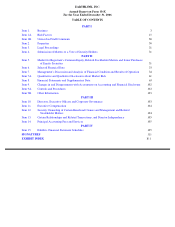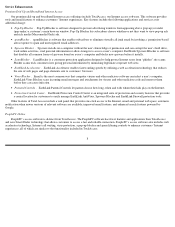Earthlink 2006 Annual Report Download - page 13
Download and view the complete annual report
Please find page 13 of the 2006 Earthlink annual report below. You can navigate through the pages in the report by either clicking on the pages listed below, or by using the keyword search tool below to find specific information within the annual report.
commercial feasibility of emerging alternative broadband access technologies, including broadband over power lines and other technologies, to
gain further wholesale broadband access in order to create greater retail broadband competition. We will also continue to offer products,
features and services which enhance customers’ online experiences and thus create consumer demand.
Wholesale network access. In August 2003, the FCC issued its UNE Triennial Review Order which, among other things, eliminated line
sharing over a three-year transition period. Line sharing allowed CLECs such as Covad, one of our largest providers of wholesale broadband
access, to purchase the High Frequency Portion of the Loop (“HFPL”) from an ILEC for less than the cost of purchasing an entire line.
Purchasing the HFPL as a separate Unbundled Network Element (“UNE”) allows Covad to offer wholesale DSL services to EarthLink on
favorable rates and terms. In addition, the FCC has determined that ILECs are not required to offer to CLECs such as Covad fiber-based and
hybrid fiber-based UNEs, meaning that as the ILECs deploy fiber throughout their networks, access to those consumers could be limited.
Other. In connection with the FCC’s approval of the merger of AT&T Corp. with BellSouth Communications, the FCC required the
merged entity to commit to certain conditions, which could affect our operations. Generally, AT&T must abide by the conditions for 42 months
(June 29, 2010) although specific conditions may have longer or shorter compliance periods. The conditions generally obligate AT&T to offer:
all existing UNEs and collocations at current rates; high-capacity loops; special access services at current rates and on a non-discriminatory
basis; wholesale ADSL transmission services at capped rates; rate rollbacks for DS1, DS3 and Ethernet services; service performance metrics
for special access services; a commitment to abide by the FCC’s Net Neutrality Policy Statement; settlement-free Internet peering; divestiture
of the 2.5 GHz spectrum held by BellSouth; and build-out requirements for the 2.3 GHz band. Many of these conditions could benefit our
services, such as our line-powered voice services and New Edge’s services, by having a positive impact on our costs and provisioning for
EarthLink and New Edge services. In addition, the net neutrality obligation could provide a positive long-term impact by facilitating consumer
use of the Internet.
These conditions benefit our services, such as the UNE-L and collocation rate certainty and availability which benefits our line-powered
voice services and New Edge; the ADSL transmission requirement which mandates that services are offered; the special access conditions
which should have a positive impact on costs and provisioning times to enterprise customers for New Edge and EarthLink services and could
extend to our municipal wireless to the extent it uses special access for backhaul/network; and the net neutrality obligation which provides a
positive long-term impact on constraining AT&T (and possibly other ILECs/cable operators) from engaging in overt discrimination and
provides enforceable recourse in the event of discrimination.
Broadband Access Agreements
We have commercial agreements with varying terms with all of our significant broadband network providers. Our largest providers of
broadband connectivity are Covad and Time Warner Cable. We also do lesser amounts of business with a wide variety of local, regional and
other national providers. The following table summarizes the expiration dates for these agreements:
12
Broadband Network Provider
Contract Expiration
Covad Communications Group Inc.
Month
-
to
-
Month
Comcast Corporation
January 2009
Verizon Communications Inc.
October 2008
AT&T (formerly BellSouth Corporation)
December 2008
Qwest Corporation
November 2009
Time Warner Cable/Bright House Networks
November 2010
























